Hospitality in the UK Report 2022
VerifiedAdded on 2022/10/19
|13
|3974
|15
AI Summary
Contribute Materials
Your contribution can guide someone’s learning journey. Share your
documents today.
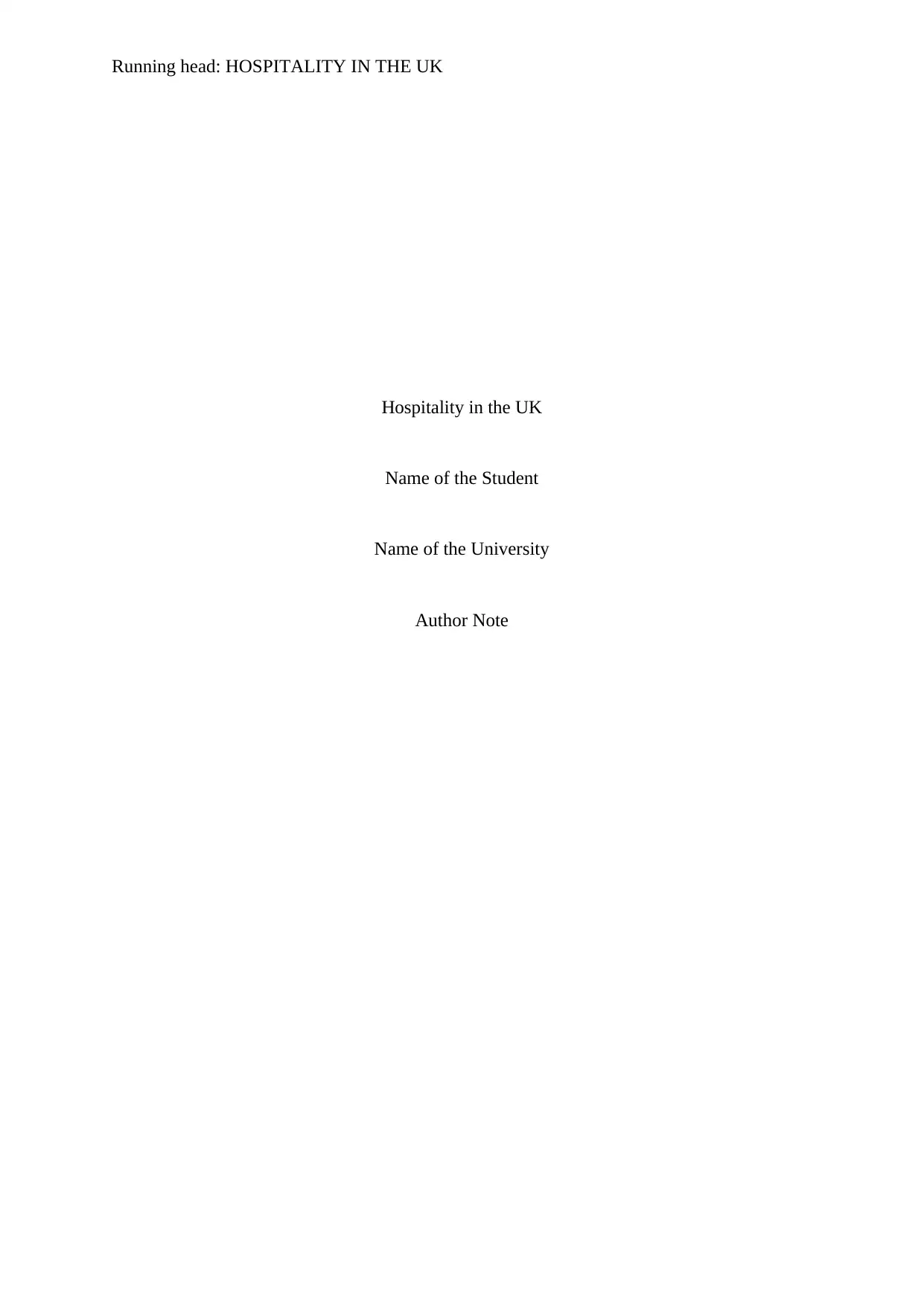
Running head: HOSPITALITY IN THE UK
Hospitality in the UK
Name of the Student
Name of the University
Author Note
Hospitality in the UK
Name of the Student
Name of the University
Author Note
Secure Best Marks with AI Grader
Need help grading? Try our AI Grader for instant feedback on your assignments.
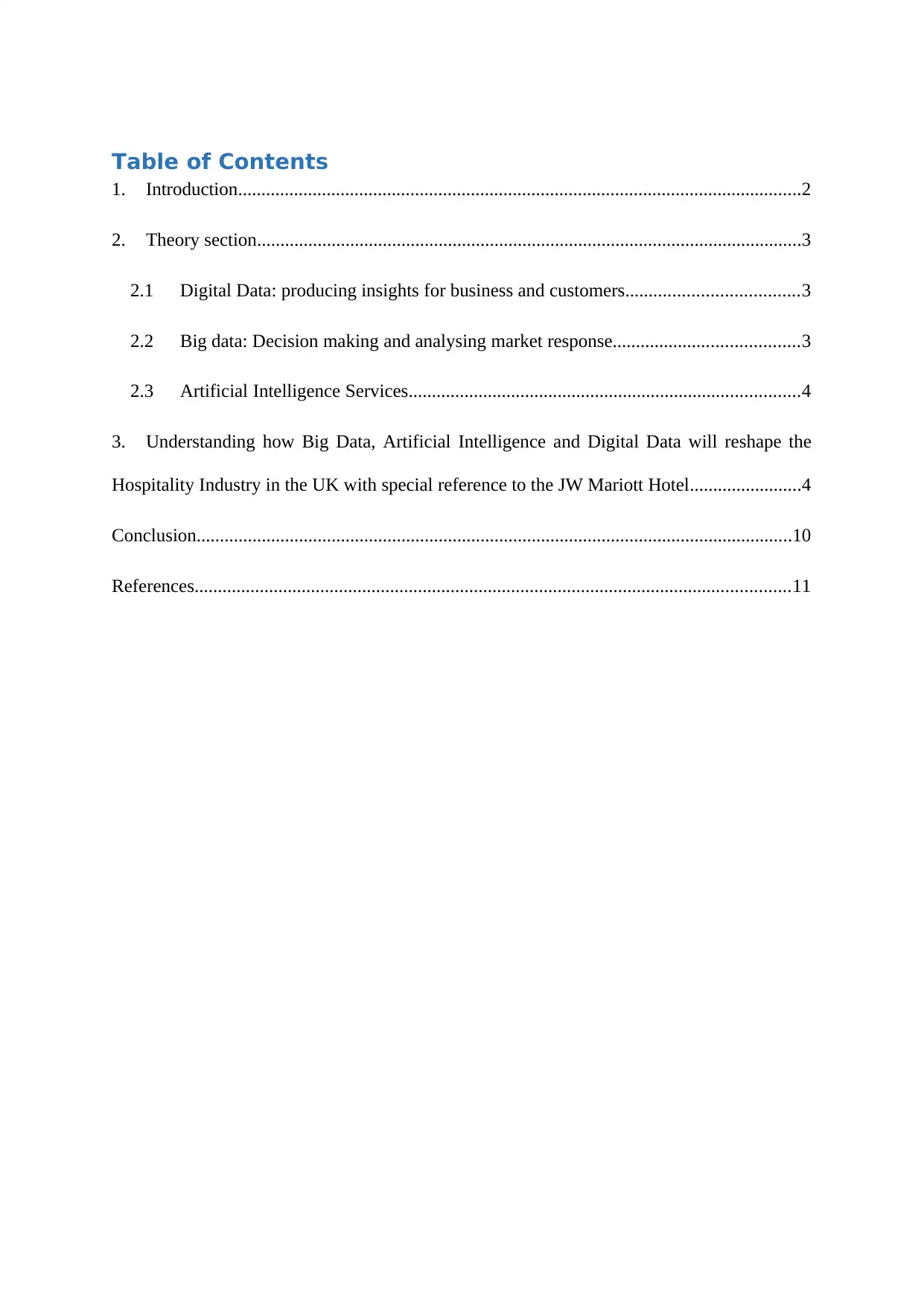
Table of Contents
1. Introduction.........................................................................................................................2
2. Theory section.....................................................................................................................3
2.1 Digital Data: producing insights for business and customers.....................................3
2.2 Big data: Decision making and analysing market response........................................3
2.3 Artificial Intelligence Services....................................................................................4
3. Understanding how Big Data, Artificial Intelligence and Digital Data will reshape the
Hospitality Industry in the UK with special reference to the JW Mariott Hotel........................4
Conclusion................................................................................................................................10
References................................................................................................................................11
1. Introduction.........................................................................................................................2
2. Theory section.....................................................................................................................3
2.1 Digital Data: producing insights for business and customers.....................................3
2.2 Big data: Decision making and analysing market response........................................3
2.3 Artificial Intelligence Services....................................................................................4
3. Understanding how Big Data, Artificial Intelligence and Digital Data will reshape the
Hospitality Industry in the UK with special reference to the JW Mariott Hotel........................4
Conclusion................................................................................................................................10
References................................................................................................................................11
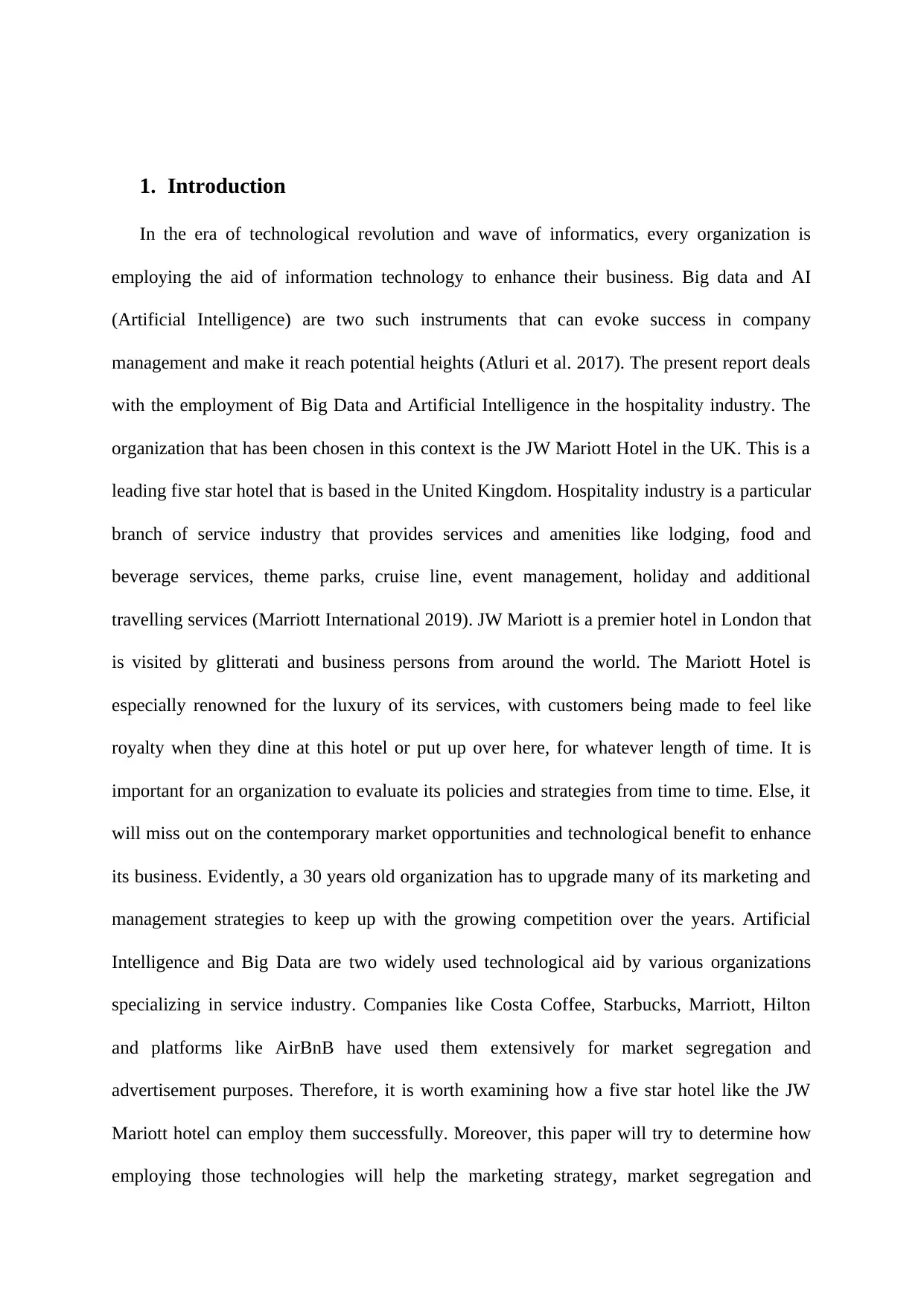
1. Introduction
In the era of technological revolution and wave of informatics, every organization is
employing the aid of information technology to enhance their business. Big data and AI
(Artificial Intelligence) are two such instruments that can evoke success in company
management and make it reach potential heights (Atluri et al. 2017). The present report deals
with the employment of Big Data and Artificial Intelligence in the hospitality industry. The
organization that has been chosen in this context is the JW Mariott Hotel in the UK. This is a
leading five star hotel that is based in the United Kingdom. Hospitality industry is a particular
branch of service industry that provides services and amenities like lodging, food and
beverage services, theme parks, cruise line, event management, holiday and additional
travelling services (Marriott International 2019). JW Mariott is a premier hotel in London that
is visited by glitterati and business persons from around the world. The Mariott Hotel is
especially renowned for the luxury of its services, with customers being made to feel like
royalty when they dine at this hotel or put up over here, for whatever length of time. It is
important for an organization to evaluate its policies and strategies from time to time. Else, it
will miss out on the contemporary market opportunities and technological benefit to enhance
its business. Evidently, a 30 years old organization has to upgrade many of its marketing and
management strategies to keep up with the growing competition over the years. Artificial
Intelligence and Big Data are two widely used technological aid by various organizations
specializing in service industry. Companies like Costa Coffee, Starbucks, Marriott, Hilton
and platforms like AirBnB have used them extensively for market segregation and
advertisement purposes. Therefore, it is worth examining how a five star hotel like the JW
Mariott hotel can employ them successfully. Moreover, this paper will try to determine how
employing those technologies will help the marketing strategy, market segregation and
In the era of technological revolution and wave of informatics, every organization is
employing the aid of information technology to enhance their business. Big data and AI
(Artificial Intelligence) are two such instruments that can evoke success in company
management and make it reach potential heights (Atluri et al. 2017). The present report deals
with the employment of Big Data and Artificial Intelligence in the hospitality industry. The
organization that has been chosen in this context is the JW Mariott Hotel in the UK. This is a
leading five star hotel that is based in the United Kingdom. Hospitality industry is a particular
branch of service industry that provides services and amenities like lodging, food and
beverage services, theme parks, cruise line, event management, holiday and additional
travelling services (Marriott International 2019). JW Mariott is a premier hotel in London that
is visited by glitterati and business persons from around the world. The Mariott Hotel is
especially renowned for the luxury of its services, with customers being made to feel like
royalty when they dine at this hotel or put up over here, for whatever length of time. It is
important for an organization to evaluate its policies and strategies from time to time. Else, it
will miss out on the contemporary market opportunities and technological benefit to enhance
its business. Evidently, a 30 years old organization has to upgrade many of its marketing and
management strategies to keep up with the growing competition over the years. Artificial
Intelligence and Big Data are two widely used technological aid by various organizations
specializing in service industry. Companies like Costa Coffee, Starbucks, Marriott, Hilton
and platforms like AirBnB have used them extensively for market segregation and
advertisement purposes. Therefore, it is worth examining how a five star hotel like the JW
Mariott hotel can employ them successfully. Moreover, this paper will try to determine how
employing those technologies will help the marketing strategy, market segregation and
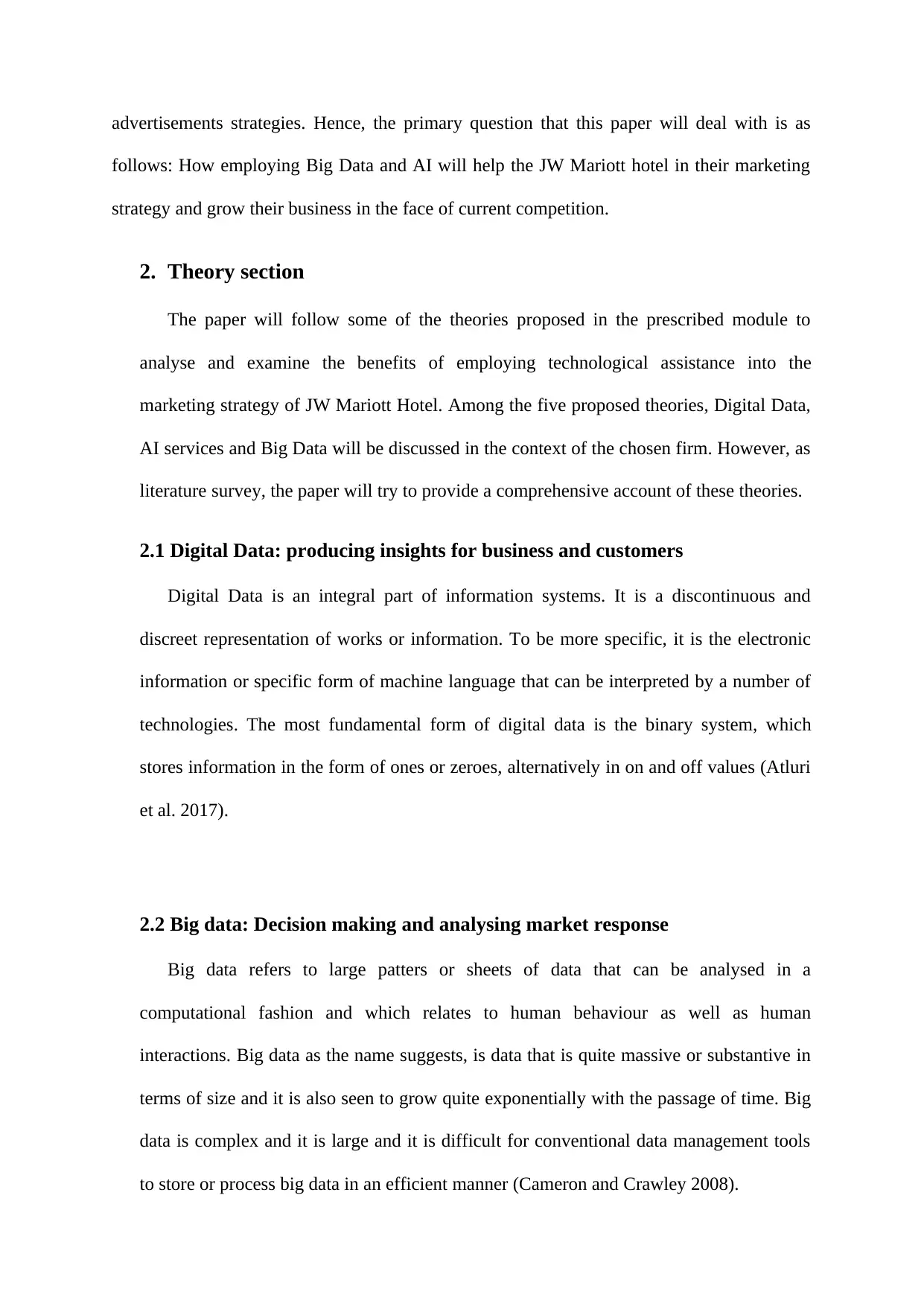
advertisements strategies. Hence, the primary question that this paper will deal with is as
follows: How employing Big Data and AI will help the JW Mariott hotel in their marketing
strategy and grow their business in the face of current competition.
2. Theory section
The paper will follow some of the theories proposed in the prescribed module to
analyse and examine the benefits of employing technological assistance into the
marketing strategy of JW Mariott Hotel. Among the five proposed theories, Digital Data,
AI services and Big Data will be discussed in the context of the chosen firm. However, as
literature survey, the paper will try to provide a comprehensive account of these theories.
2.1 Digital Data: producing insights for business and customers
Digital Data is an integral part of information systems. It is a discontinuous and
discreet representation of works or information. To be more specific, it is the electronic
information or specific form of machine language that can be interpreted by a number of
technologies. The most fundamental form of digital data is the binary system, which
stores information in the form of ones or zeroes, alternatively in on and off values (Atluri
et al. 2017).
2.2 Big data: Decision making and analysing market response
Big data refers to large patters or sheets of data that can be analysed in a
computational fashion and which relates to human behaviour as well as human
interactions. Big data as the name suggests, is data that is quite massive or substantive in
terms of size and it is also seen to grow quite exponentially with the passage of time. Big
data is complex and it is large and it is difficult for conventional data management tools
to store or process big data in an efficient manner (Cameron and Crawley 2008).
follows: How employing Big Data and AI will help the JW Mariott hotel in their marketing
strategy and grow their business in the face of current competition.
2. Theory section
The paper will follow some of the theories proposed in the prescribed module to
analyse and examine the benefits of employing technological assistance into the
marketing strategy of JW Mariott Hotel. Among the five proposed theories, Digital Data,
AI services and Big Data will be discussed in the context of the chosen firm. However, as
literature survey, the paper will try to provide a comprehensive account of these theories.
2.1 Digital Data: producing insights for business and customers
Digital Data is an integral part of information systems. It is a discontinuous and
discreet representation of works or information. To be more specific, it is the electronic
information or specific form of machine language that can be interpreted by a number of
technologies. The most fundamental form of digital data is the binary system, which
stores information in the form of ones or zeroes, alternatively in on and off values (Atluri
et al. 2017).
2.2 Big data: Decision making and analysing market response
Big data refers to large patters or sheets of data that can be analysed in a
computational fashion and which relates to human behaviour as well as human
interactions. Big data as the name suggests, is data that is quite massive or substantive in
terms of size and it is also seen to grow quite exponentially with the passage of time. Big
data is complex and it is large and it is difficult for conventional data management tools
to store or process big data in an efficient manner (Cameron and Crawley 2008).
Secure Best Marks with AI Grader
Need help grading? Try our AI Grader for instant feedback on your assignments.
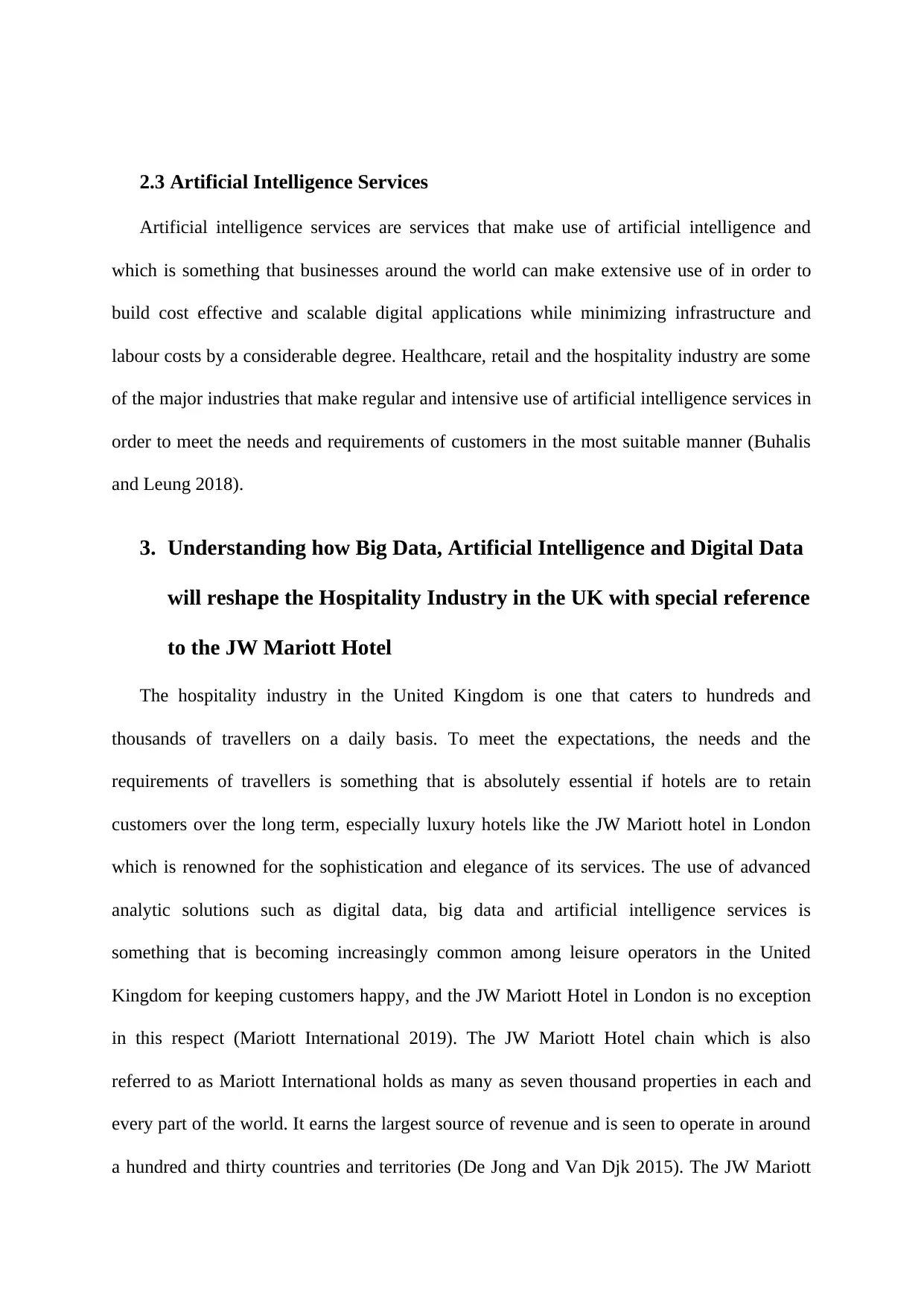
2.3 Artificial Intelligence Services
Artificial intelligence services are services that make use of artificial intelligence and
which is something that businesses around the world can make extensive use of in order to
build cost effective and scalable digital applications while minimizing infrastructure and
labour costs by a considerable degree. Healthcare, retail and the hospitality industry are some
of the major industries that make regular and intensive use of artificial intelligence services in
order to meet the needs and requirements of customers in the most suitable manner (Buhalis
and Leung 2018).
3. Understanding how Big Data, Artificial Intelligence and Digital Data
will reshape the Hospitality Industry in the UK with special reference
to the JW Mariott Hotel
The hospitality industry in the United Kingdom is one that caters to hundreds and
thousands of travellers on a daily basis. To meet the expectations, the needs and the
requirements of travellers is something that is absolutely essential if hotels are to retain
customers over the long term, especially luxury hotels like the JW Mariott hotel in London
which is renowned for the sophistication and elegance of its services. The use of advanced
analytic solutions such as digital data, big data and artificial intelligence services is
something that is becoming increasingly common among leisure operators in the United
Kingdom for keeping customers happy, and the JW Mariott Hotel in London is no exception
in this respect (Mariott International 2019). The JW Mariott Hotel chain which is also
referred to as Mariott International holds as many as seven thousand properties in each and
every part of the world. It earns the largest source of revenue and is seen to operate in around
a hundred and thirty countries and territories (De Jong and Van Djk 2015). The JW Mariott
Artificial intelligence services are services that make use of artificial intelligence and
which is something that businesses around the world can make extensive use of in order to
build cost effective and scalable digital applications while minimizing infrastructure and
labour costs by a considerable degree. Healthcare, retail and the hospitality industry are some
of the major industries that make regular and intensive use of artificial intelligence services in
order to meet the needs and requirements of customers in the most suitable manner (Buhalis
and Leung 2018).
3. Understanding how Big Data, Artificial Intelligence and Digital Data
will reshape the Hospitality Industry in the UK with special reference
to the JW Mariott Hotel
The hospitality industry in the United Kingdom is one that caters to hundreds and
thousands of travellers on a daily basis. To meet the expectations, the needs and the
requirements of travellers is something that is absolutely essential if hotels are to retain
customers over the long term, especially luxury hotels like the JW Mariott hotel in London
which is renowned for the sophistication and elegance of its services. The use of advanced
analytic solutions such as digital data, big data and artificial intelligence services is
something that is becoming increasingly common among leisure operators in the United
Kingdom for keeping customers happy, and the JW Mariott Hotel in London is no exception
in this respect (Mariott International 2019). The JW Mariott Hotel chain which is also
referred to as Mariott International holds as many as seven thousand properties in each and
every part of the world. It earns the largest source of revenue and is seen to operate in around
a hundred and thirty countries and territories (De Jong and Van Djk 2015). The JW Mariott
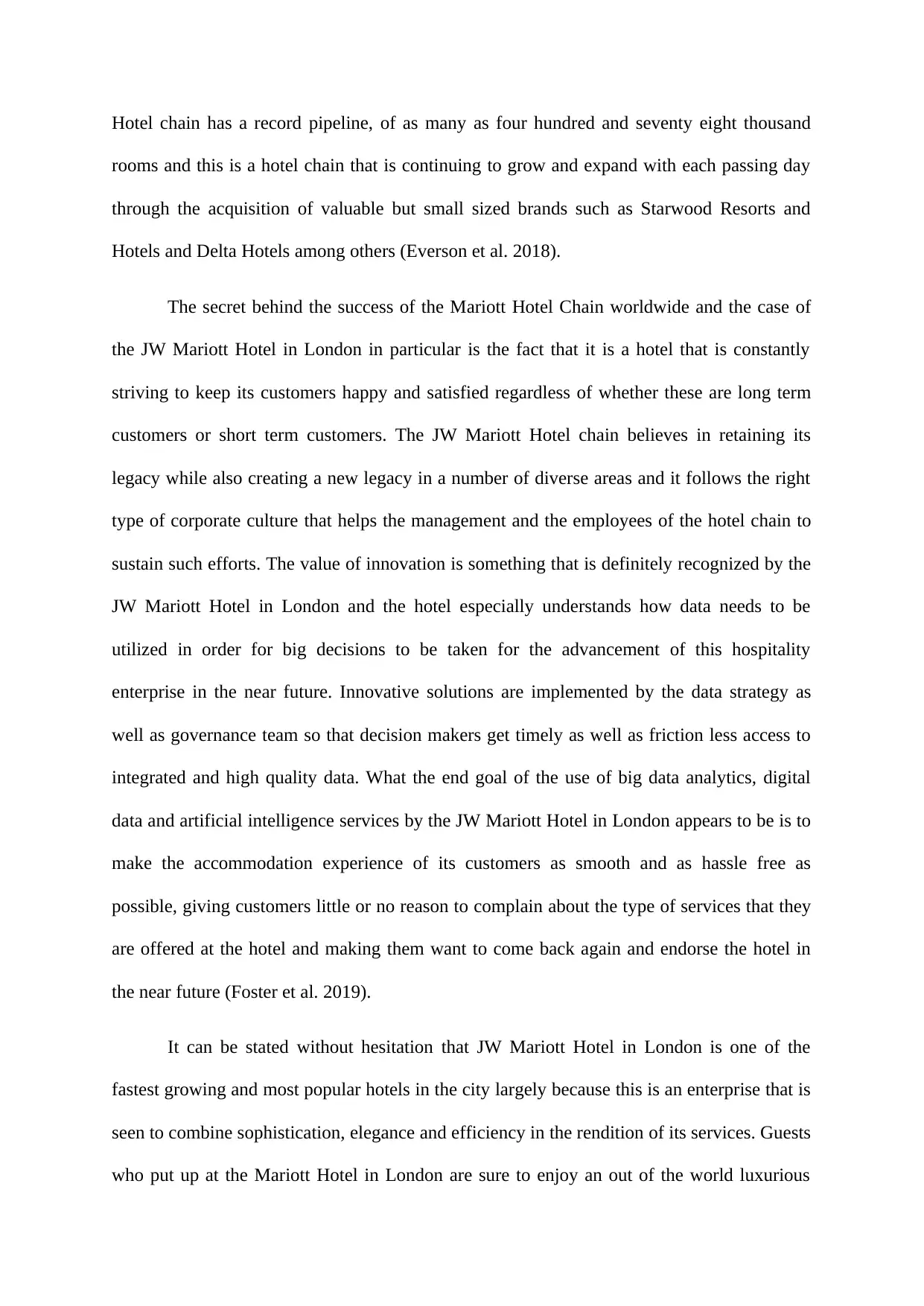
Hotel chain has a record pipeline, of as many as four hundred and seventy eight thousand
rooms and this is a hotel chain that is continuing to grow and expand with each passing day
through the acquisition of valuable but small sized brands such as Starwood Resorts and
Hotels and Delta Hotels among others (Everson et al. 2018).
The secret behind the success of the Mariott Hotel Chain worldwide and the case of
the JW Mariott Hotel in London in particular is the fact that it is a hotel that is constantly
striving to keep its customers happy and satisfied regardless of whether these are long term
customers or short term customers. The JW Mariott Hotel chain believes in retaining its
legacy while also creating a new legacy in a number of diverse areas and it follows the right
type of corporate culture that helps the management and the employees of the hotel chain to
sustain such efforts. The value of innovation is something that is definitely recognized by the
JW Mariott Hotel in London and the hotel especially understands how data needs to be
utilized in order for big decisions to be taken for the advancement of this hospitality
enterprise in the near future. Innovative solutions are implemented by the data strategy as
well as governance team so that decision makers get timely as well as friction less access to
integrated and high quality data. What the end goal of the use of big data analytics, digital
data and artificial intelligence services by the JW Mariott Hotel in London appears to be is to
make the accommodation experience of its customers as smooth and as hassle free as
possible, giving customers little or no reason to complain about the type of services that they
are offered at the hotel and making them want to come back again and endorse the hotel in
the near future (Foster et al. 2019).
It can be stated without hesitation that JW Mariott Hotel in London is one of the
fastest growing and most popular hotels in the city largely because this is an enterprise that is
seen to combine sophistication, elegance and efficiency in the rendition of its services. Guests
who put up at the Mariott Hotel in London are sure to enjoy an out of the world luxurious
rooms and this is a hotel chain that is continuing to grow and expand with each passing day
through the acquisition of valuable but small sized brands such as Starwood Resorts and
Hotels and Delta Hotels among others (Everson et al. 2018).
The secret behind the success of the Mariott Hotel Chain worldwide and the case of
the JW Mariott Hotel in London in particular is the fact that it is a hotel that is constantly
striving to keep its customers happy and satisfied regardless of whether these are long term
customers or short term customers. The JW Mariott Hotel chain believes in retaining its
legacy while also creating a new legacy in a number of diverse areas and it follows the right
type of corporate culture that helps the management and the employees of the hotel chain to
sustain such efforts. The value of innovation is something that is definitely recognized by the
JW Mariott Hotel in London and the hotel especially understands how data needs to be
utilized in order for big decisions to be taken for the advancement of this hospitality
enterprise in the near future. Innovative solutions are implemented by the data strategy as
well as governance team so that decision makers get timely as well as friction less access to
integrated and high quality data. What the end goal of the use of big data analytics, digital
data and artificial intelligence services by the JW Mariott Hotel in London appears to be is to
make the accommodation experience of its customers as smooth and as hassle free as
possible, giving customers little or no reason to complain about the type of services that they
are offered at the hotel and making them want to come back again and endorse the hotel in
the near future (Foster et al. 2019).
It can be stated without hesitation that JW Mariott Hotel in London is one of the
fastest growing and most popular hotels in the city largely because this is an enterprise that is
seen to combine sophistication, elegance and efficiency in the rendition of its services. Guests
who put up at the Mariott Hotel in London are sure to enjoy an out of the world luxurious
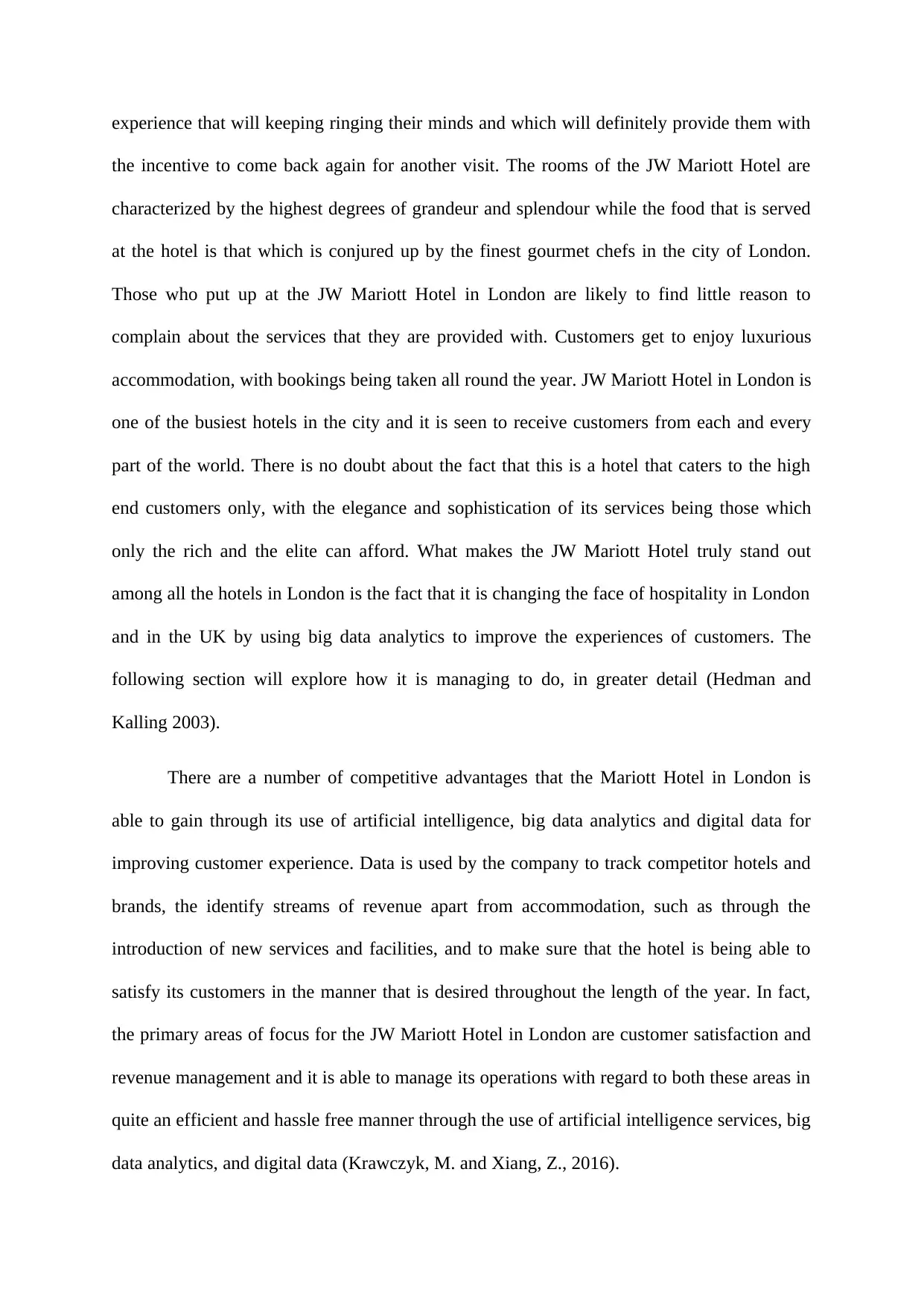
experience that will keeping ringing their minds and which will definitely provide them with
the incentive to come back again for another visit. The rooms of the JW Mariott Hotel are
characterized by the highest degrees of grandeur and splendour while the food that is served
at the hotel is that which is conjured up by the finest gourmet chefs in the city of London.
Those who put up at the JW Mariott Hotel in London are likely to find little reason to
complain about the services that they are provided with. Customers get to enjoy luxurious
accommodation, with bookings being taken all round the year. JW Mariott Hotel in London is
one of the busiest hotels in the city and it is seen to receive customers from each and every
part of the world. There is no doubt about the fact that this is a hotel that caters to the high
end customers only, with the elegance and sophistication of its services being those which
only the rich and the elite can afford. What makes the JW Mariott Hotel truly stand out
among all the hotels in London is the fact that it is changing the face of hospitality in London
and in the UK by using big data analytics to improve the experiences of customers. The
following section will explore how it is managing to do, in greater detail (Hedman and
Kalling 2003).
There are a number of competitive advantages that the Mariott Hotel in London is
able to gain through its use of artificial intelligence, big data analytics and digital data for
improving customer experience. Data is used by the company to track competitor hotels and
brands, the identify streams of revenue apart from accommodation, such as through the
introduction of new services and facilities, and to make sure that the hotel is being able to
satisfy its customers in the manner that is desired throughout the length of the year. In fact,
the primary areas of focus for the JW Mariott Hotel in London are customer satisfaction and
revenue management and it is able to manage its operations with regard to both these areas in
quite an efficient and hassle free manner through the use of artificial intelligence services, big
data analytics, and digital data (Krawczyk, M. and Xiang, Z., 2016).
the incentive to come back again for another visit. The rooms of the JW Mariott Hotel are
characterized by the highest degrees of grandeur and splendour while the food that is served
at the hotel is that which is conjured up by the finest gourmet chefs in the city of London.
Those who put up at the JW Mariott Hotel in London are likely to find little reason to
complain about the services that they are provided with. Customers get to enjoy luxurious
accommodation, with bookings being taken all round the year. JW Mariott Hotel in London is
one of the busiest hotels in the city and it is seen to receive customers from each and every
part of the world. There is no doubt about the fact that this is a hotel that caters to the high
end customers only, with the elegance and sophistication of its services being those which
only the rich and the elite can afford. What makes the JW Mariott Hotel truly stand out
among all the hotels in London is the fact that it is changing the face of hospitality in London
and in the UK by using big data analytics to improve the experiences of customers. The
following section will explore how it is managing to do, in greater detail (Hedman and
Kalling 2003).
There are a number of competitive advantages that the Mariott Hotel in London is
able to gain through its use of artificial intelligence, big data analytics and digital data for
improving customer experience. Data is used by the company to track competitor hotels and
brands, the identify streams of revenue apart from accommodation, such as through the
introduction of new services and facilities, and to make sure that the hotel is being able to
satisfy its customers in the manner that is desired throughout the length of the year. In fact,
the primary areas of focus for the JW Mariott Hotel in London are customer satisfaction and
revenue management and it is able to manage its operations with regard to both these areas in
quite an efficient and hassle free manner through the use of artificial intelligence services, big
data analytics, and digital data (Krawczyk, M. and Xiang, Z., 2016).
Paraphrase This Document
Need a fresh take? Get an instant paraphrase of this document with our AI Paraphraser
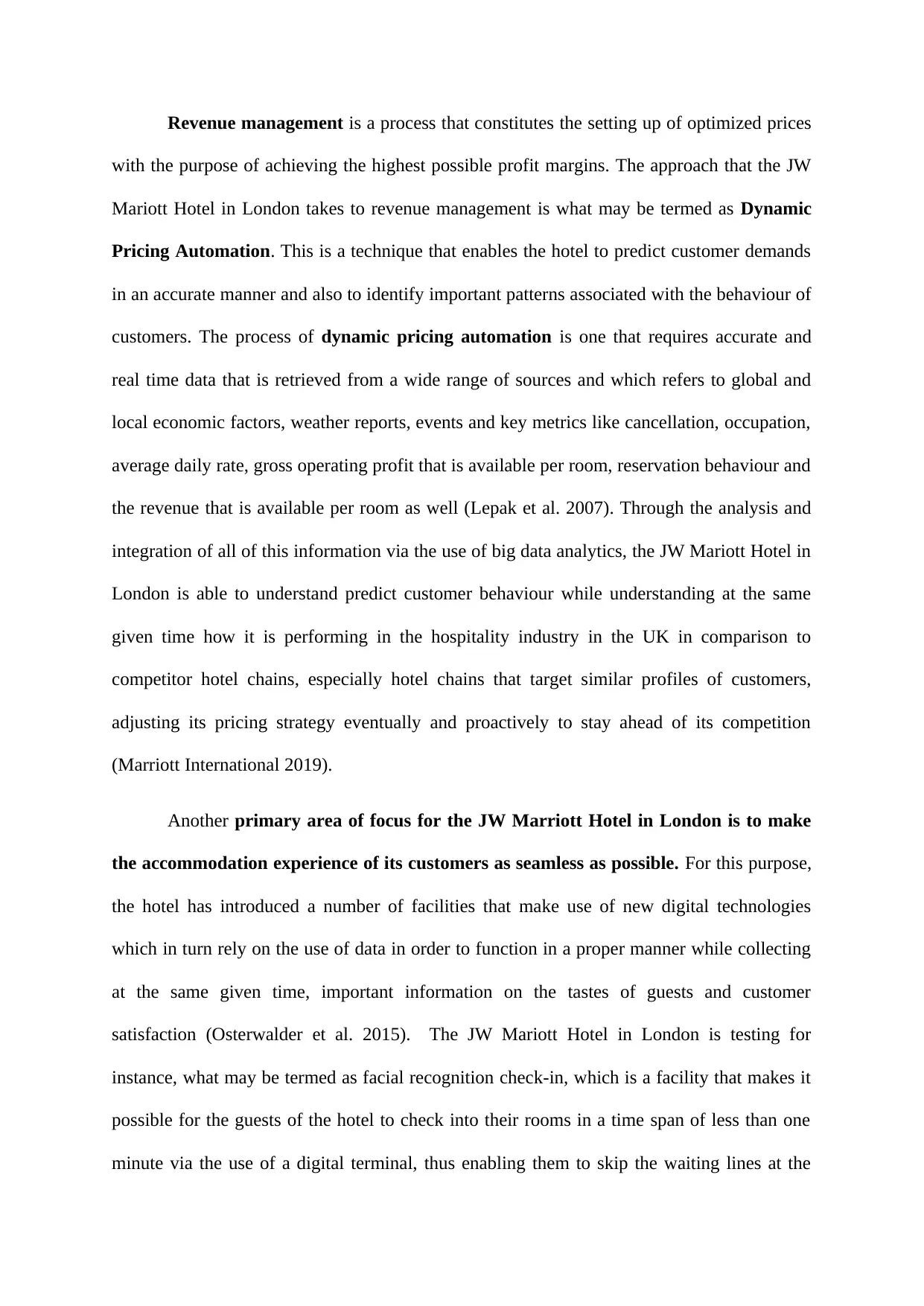
Revenue management is a process that constitutes the setting up of optimized prices
with the purpose of achieving the highest possible profit margins. The approach that the JW
Mariott Hotel in London takes to revenue management is what may be termed as Dynamic
Pricing Automation. This is a technique that enables the hotel to predict customer demands
in an accurate manner and also to identify important patterns associated with the behaviour of
customers. The process of dynamic pricing automation is one that requires accurate and
real time data that is retrieved from a wide range of sources and which refers to global and
local economic factors, weather reports, events and key metrics like cancellation, occupation,
average daily rate, gross operating profit that is available per room, reservation behaviour and
the revenue that is available per room as well (Lepak et al. 2007). Through the analysis and
integration of all of this information via the use of big data analytics, the JW Mariott Hotel in
London is able to understand predict customer behaviour while understanding at the same
given time how it is performing in the hospitality industry in the UK in comparison to
competitor hotel chains, especially hotel chains that target similar profiles of customers,
adjusting its pricing strategy eventually and proactively to stay ahead of its competition
(Marriott International 2019).
Another primary area of focus for the JW Marriott Hotel in London is to make
the accommodation experience of its customers as seamless as possible. For this purpose,
the hotel has introduced a number of facilities that make use of new digital technologies
which in turn rely on the use of data in order to function in a proper manner while collecting
at the same given time, important information on the tastes of guests and customer
satisfaction (Osterwalder et al. 2015). The JW Mariott Hotel in London is testing for
instance, what may be termed as facial recognition check-in, which is a facility that makes it
possible for the guests of the hotel to check into their rooms in a time span of less than one
minute via the use of a digital terminal, thus enabling them to skip the waiting lines at the
with the purpose of achieving the highest possible profit margins. The approach that the JW
Mariott Hotel in London takes to revenue management is what may be termed as Dynamic
Pricing Automation. This is a technique that enables the hotel to predict customer demands
in an accurate manner and also to identify important patterns associated with the behaviour of
customers. The process of dynamic pricing automation is one that requires accurate and
real time data that is retrieved from a wide range of sources and which refers to global and
local economic factors, weather reports, events and key metrics like cancellation, occupation,
average daily rate, gross operating profit that is available per room, reservation behaviour and
the revenue that is available per room as well (Lepak et al. 2007). Through the analysis and
integration of all of this information via the use of big data analytics, the JW Mariott Hotel in
London is able to understand predict customer behaviour while understanding at the same
given time how it is performing in the hospitality industry in the UK in comparison to
competitor hotel chains, especially hotel chains that target similar profiles of customers,
adjusting its pricing strategy eventually and proactively to stay ahead of its competition
(Marriott International 2019).
Another primary area of focus for the JW Marriott Hotel in London is to make
the accommodation experience of its customers as seamless as possible. For this purpose,
the hotel has introduced a number of facilities that make use of new digital technologies
which in turn rely on the use of data in order to function in a proper manner while collecting
at the same given time, important information on the tastes of guests and customer
satisfaction (Osterwalder et al. 2015). The JW Mariott Hotel in London is testing for
instance, what may be termed as facial recognition check-in, which is a facility that makes it
possible for the guests of the hotel to check into their rooms in a time span of less than one
minute via the use of a digital terminal, thus enabling them to skip the waiting lines at the
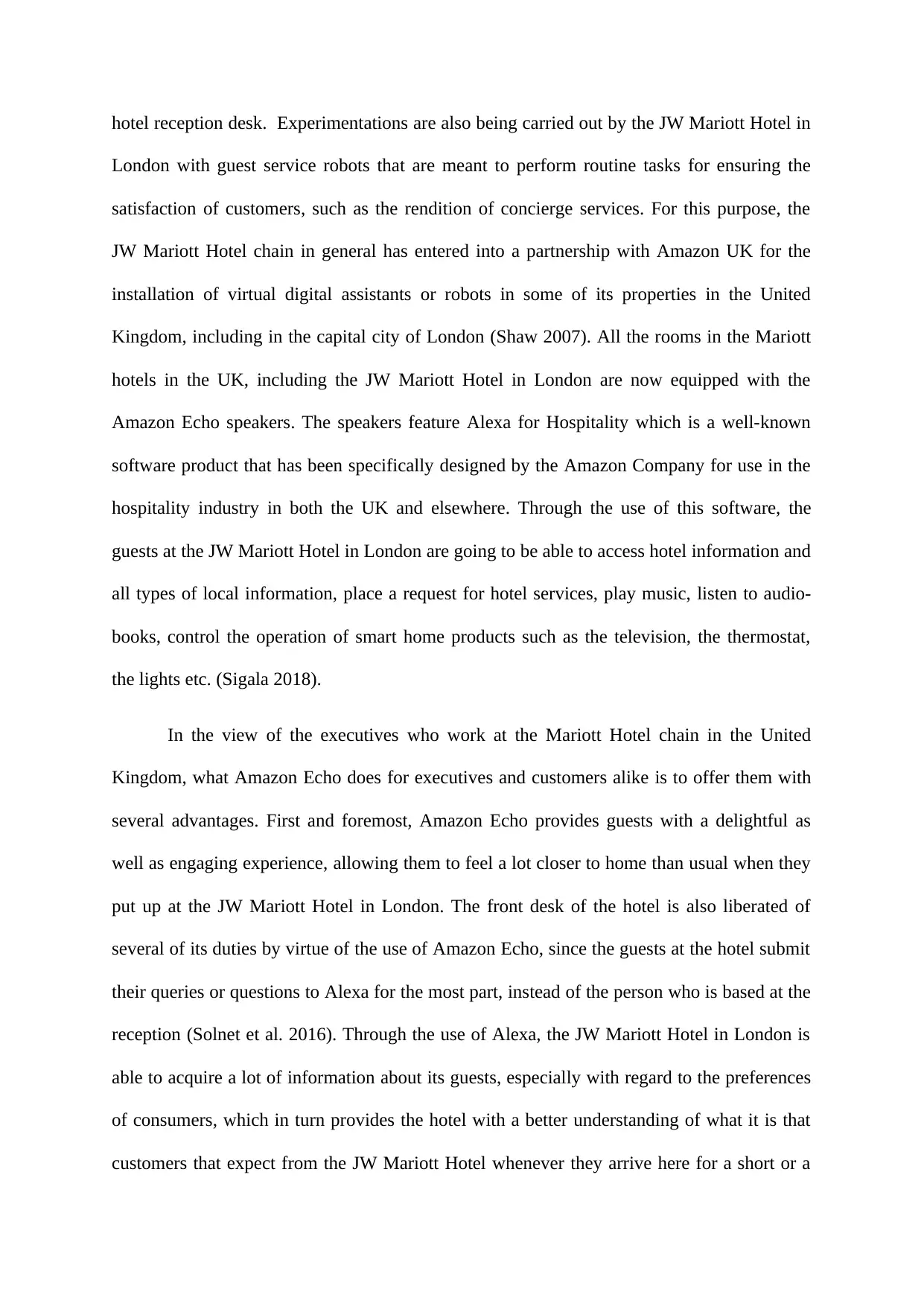
hotel reception desk. Experimentations are also being carried out by the JW Mariott Hotel in
London with guest service robots that are meant to perform routine tasks for ensuring the
satisfaction of customers, such as the rendition of concierge services. For this purpose, the
JW Mariott Hotel chain in general has entered into a partnership with Amazon UK for the
installation of virtual digital assistants or robots in some of its properties in the United
Kingdom, including in the capital city of London (Shaw 2007). All the rooms in the Mariott
hotels in the UK, including the JW Mariott Hotel in London are now equipped with the
Amazon Echo speakers. The speakers feature Alexa for Hospitality which is a well-known
software product that has been specifically designed by the Amazon Company for use in the
hospitality industry in both the UK and elsewhere. Through the use of this software, the
guests at the JW Mariott Hotel in London are going to be able to access hotel information and
all types of local information, place a request for hotel services, play music, listen to audio-
books, control the operation of smart home products such as the television, the thermostat,
the lights etc. (Sigala 2018).
In the view of the executives who work at the Mariott Hotel chain in the United
Kingdom, what Amazon Echo does for executives and customers alike is to offer them with
several advantages. First and foremost, Amazon Echo provides guests with a delightful as
well as engaging experience, allowing them to feel a lot closer to home than usual when they
put up at the JW Mariott Hotel in London. The front desk of the hotel is also liberated of
several of its duties by virtue of the use of Amazon Echo, since the guests at the hotel submit
their queries or questions to Alexa for the most part, instead of the person who is based at the
reception (Solnet et al. 2016). Through the use of Alexa, the JW Mariott Hotel in London is
able to acquire a lot of information about its guests, especially with regard to the preferences
of consumers, which in turn provides the hotel with a better understanding of what it is that
customers that expect from the JW Mariott Hotel whenever they arrive here for a short or a
London with guest service robots that are meant to perform routine tasks for ensuring the
satisfaction of customers, such as the rendition of concierge services. For this purpose, the
JW Mariott Hotel chain in general has entered into a partnership with Amazon UK for the
installation of virtual digital assistants or robots in some of its properties in the United
Kingdom, including in the capital city of London (Shaw 2007). All the rooms in the Mariott
hotels in the UK, including the JW Mariott Hotel in London are now equipped with the
Amazon Echo speakers. The speakers feature Alexa for Hospitality which is a well-known
software product that has been specifically designed by the Amazon Company for use in the
hospitality industry in both the UK and elsewhere. Through the use of this software, the
guests at the JW Mariott Hotel in London are going to be able to access hotel information and
all types of local information, place a request for hotel services, play music, listen to audio-
books, control the operation of smart home products such as the television, the thermostat,
the lights etc. (Sigala 2018).
In the view of the executives who work at the Mariott Hotel chain in the United
Kingdom, what Amazon Echo does for executives and customers alike is to offer them with
several advantages. First and foremost, Amazon Echo provides guests with a delightful as
well as engaging experience, allowing them to feel a lot closer to home than usual when they
put up at the JW Mariott Hotel in London. The front desk of the hotel is also liberated of
several of its duties by virtue of the use of Amazon Echo, since the guests at the hotel submit
their queries or questions to Alexa for the most part, instead of the person who is based at the
reception (Solnet et al. 2016). Through the use of Alexa, the JW Mariott Hotel in London is
able to acquire a lot of information about its guests, especially with regard to the preferences
of consumers, which in turn provides the hotel with a better understanding of what it is that
customers that expect from the JW Mariott Hotel whenever they arrive here for a short or a
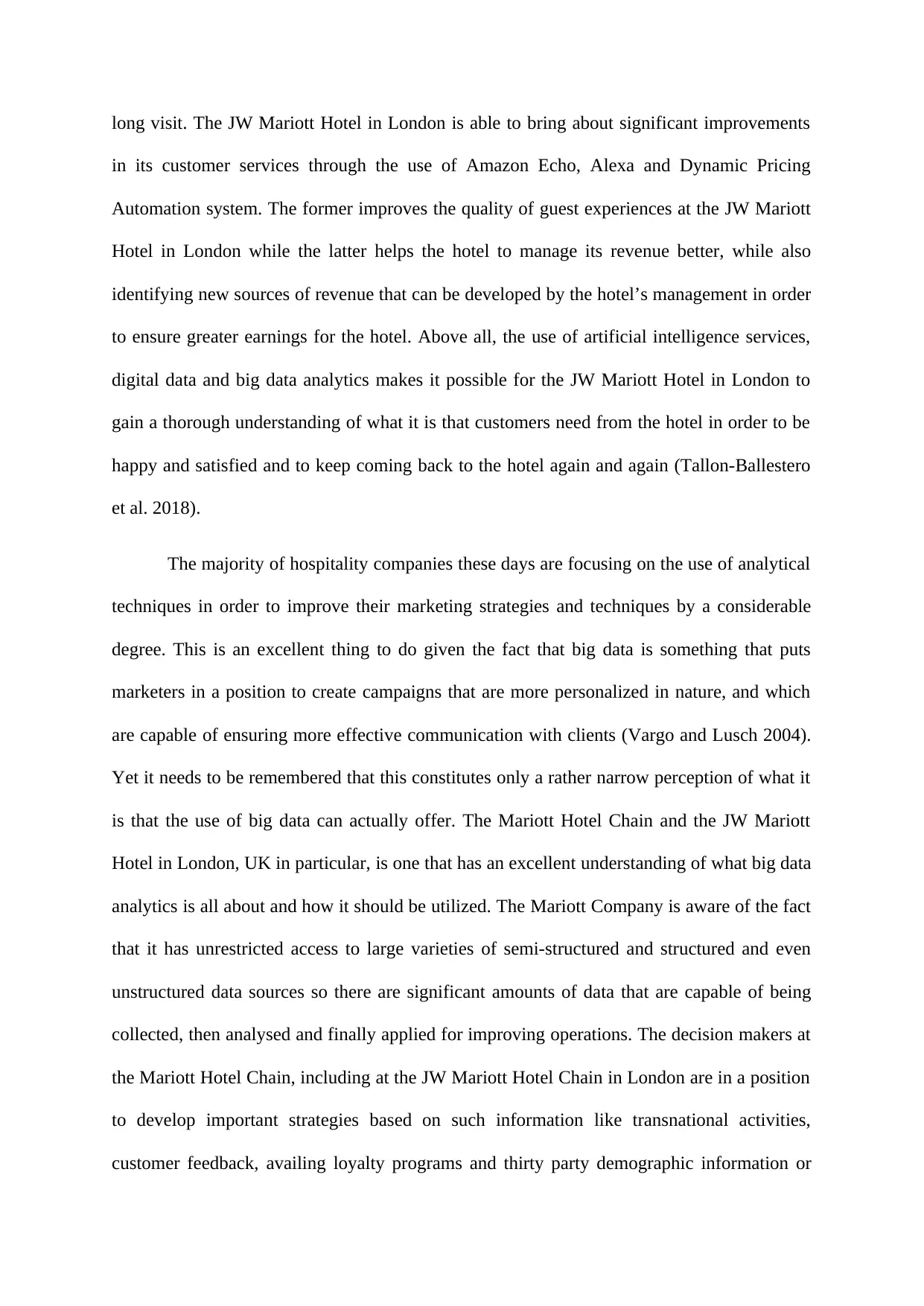
long visit. The JW Mariott Hotel in London is able to bring about significant improvements
in its customer services through the use of Amazon Echo, Alexa and Dynamic Pricing
Automation system. The former improves the quality of guest experiences at the JW Mariott
Hotel in London while the latter helps the hotel to manage its revenue better, while also
identifying new sources of revenue that can be developed by the hotel’s management in order
to ensure greater earnings for the hotel. Above all, the use of artificial intelligence services,
digital data and big data analytics makes it possible for the JW Mariott Hotel in London to
gain a thorough understanding of what it is that customers need from the hotel in order to be
happy and satisfied and to keep coming back to the hotel again and again (Tallon-Ballestero
et al. 2018).
The majority of hospitality companies these days are focusing on the use of analytical
techniques in order to improve their marketing strategies and techniques by a considerable
degree. This is an excellent thing to do given the fact that big data is something that puts
marketers in a position to create campaigns that are more personalized in nature, and which
are capable of ensuring more effective communication with clients (Vargo and Lusch 2004).
Yet it needs to be remembered that this constitutes only a rather narrow perception of what it
is that the use of big data can actually offer. The Mariott Hotel Chain and the JW Mariott
Hotel in London, UK in particular, is one that has an excellent understanding of what big data
analytics is all about and how it should be utilized. The Mariott Company is aware of the fact
that it has unrestricted access to large varieties of semi-structured and structured and even
unstructured data sources so there are significant amounts of data that are capable of being
collected, then analysed and finally applied for improving operations. The decision makers at
the Mariott Hotel Chain, including at the JW Mariott Hotel Chain in London are in a position
to develop important strategies based on such information like transnational activities,
customer feedback, availing loyalty programs and thirty party demographic information or
in its customer services through the use of Amazon Echo, Alexa and Dynamic Pricing
Automation system. The former improves the quality of guest experiences at the JW Mariott
Hotel in London while the latter helps the hotel to manage its revenue better, while also
identifying new sources of revenue that can be developed by the hotel’s management in order
to ensure greater earnings for the hotel. Above all, the use of artificial intelligence services,
digital data and big data analytics makes it possible for the JW Mariott Hotel in London to
gain a thorough understanding of what it is that customers need from the hotel in order to be
happy and satisfied and to keep coming back to the hotel again and again (Tallon-Ballestero
et al. 2018).
The majority of hospitality companies these days are focusing on the use of analytical
techniques in order to improve their marketing strategies and techniques by a considerable
degree. This is an excellent thing to do given the fact that big data is something that puts
marketers in a position to create campaigns that are more personalized in nature, and which
are capable of ensuring more effective communication with clients (Vargo and Lusch 2004).
Yet it needs to be remembered that this constitutes only a rather narrow perception of what it
is that the use of big data can actually offer. The Mariott Hotel Chain and the JW Mariott
Hotel in London, UK in particular, is one that has an excellent understanding of what big data
analytics is all about and how it should be utilized. The Mariott Company is aware of the fact
that it has unrestricted access to large varieties of semi-structured and structured and even
unstructured data sources so there are significant amounts of data that are capable of being
collected, then analysed and finally applied for improving operations. The decision makers at
the Mariott Hotel Chain, including at the JW Mariott Hotel Chain in London are in a position
to develop important strategies based on such information like transnational activities,
customer feedback, availing loyalty programs and thirty party demographic information or
Secure Best Marks with AI Grader
Need help grading? Try our AI Grader for instant feedback on your assignments.
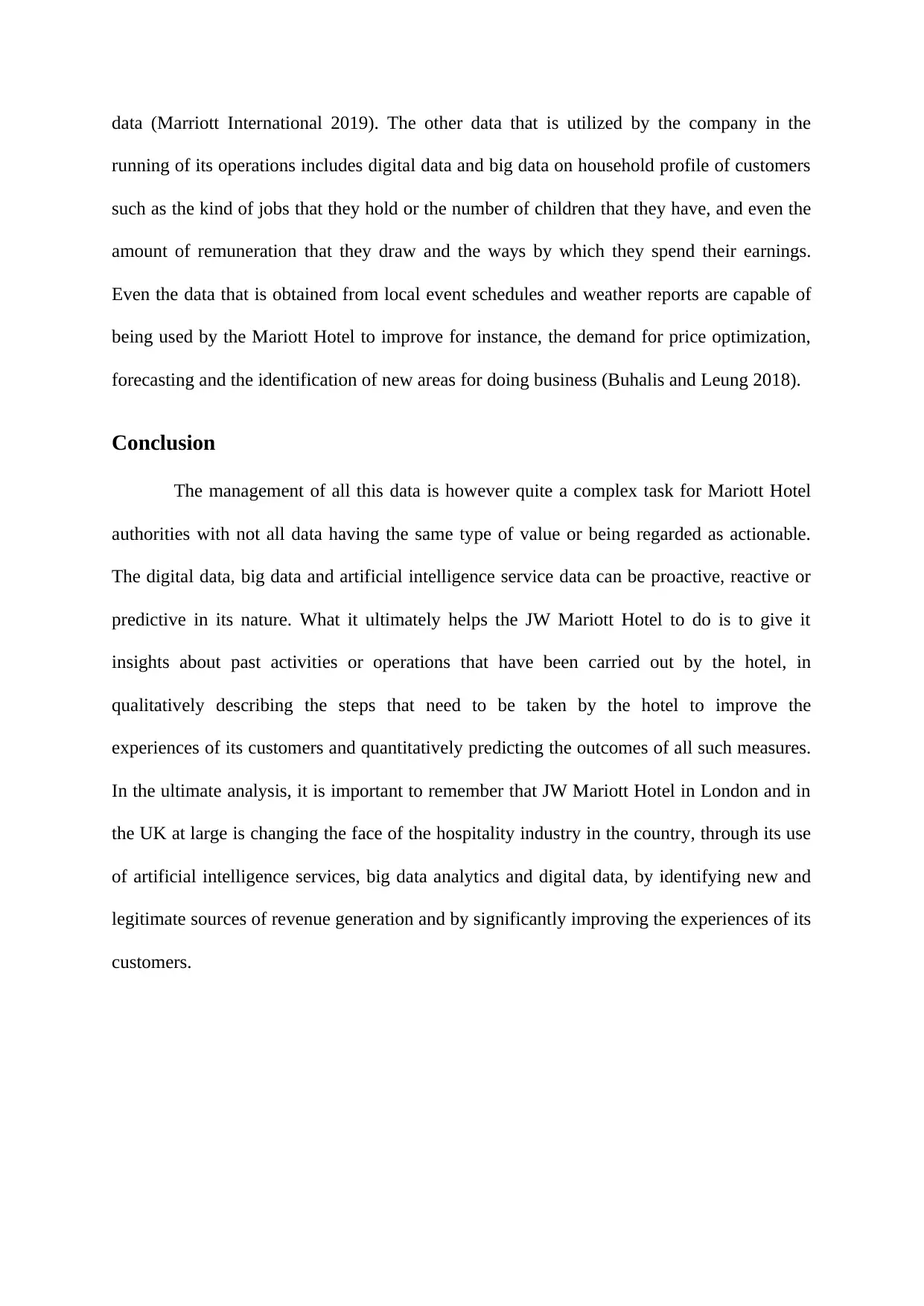
data (Marriott International 2019). The other data that is utilized by the company in the
running of its operations includes digital data and big data on household profile of customers
such as the kind of jobs that they hold or the number of children that they have, and even the
amount of remuneration that they draw and the ways by which they spend their earnings.
Even the data that is obtained from local event schedules and weather reports are capable of
being used by the Mariott Hotel to improve for instance, the demand for price optimization,
forecasting and the identification of new areas for doing business (Buhalis and Leung 2018).
Conclusion
The management of all this data is however quite a complex task for Mariott Hotel
authorities with not all data having the same type of value or being regarded as actionable.
The digital data, big data and artificial intelligence service data can be proactive, reactive or
predictive in its nature. What it ultimately helps the JW Mariott Hotel to do is to give it
insights about past activities or operations that have been carried out by the hotel, in
qualitatively describing the steps that need to be taken by the hotel to improve the
experiences of its customers and quantitatively predicting the outcomes of all such measures.
In the ultimate analysis, it is important to remember that JW Mariott Hotel in London and in
the UK at large is changing the face of the hospitality industry in the country, through its use
of artificial intelligence services, big data analytics and digital data, by identifying new and
legitimate sources of revenue generation and by significantly improving the experiences of its
customers.
running of its operations includes digital data and big data on household profile of customers
such as the kind of jobs that they hold or the number of children that they have, and even the
amount of remuneration that they draw and the ways by which they spend their earnings.
Even the data that is obtained from local event schedules and weather reports are capable of
being used by the Mariott Hotel to improve for instance, the demand for price optimization,
forecasting and the identification of new areas for doing business (Buhalis and Leung 2018).
Conclusion
The management of all this data is however quite a complex task for Mariott Hotel
authorities with not all data having the same type of value or being regarded as actionable.
The digital data, big data and artificial intelligence service data can be proactive, reactive or
predictive in its nature. What it ultimately helps the JW Mariott Hotel to do is to give it
insights about past activities or operations that have been carried out by the hotel, in
qualitatively describing the steps that need to be taken by the hotel to improve the
experiences of its customers and quantitatively predicting the outcomes of all such measures.
In the ultimate analysis, it is important to remember that JW Mariott Hotel in London and in
the UK at large is changing the face of the hospitality industry in the country, through its use
of artificial intelligence services, big data analytics and digital data, by identifying new and
legitimate sources of revenue generation and by significantly improving the experiences of its
customers.
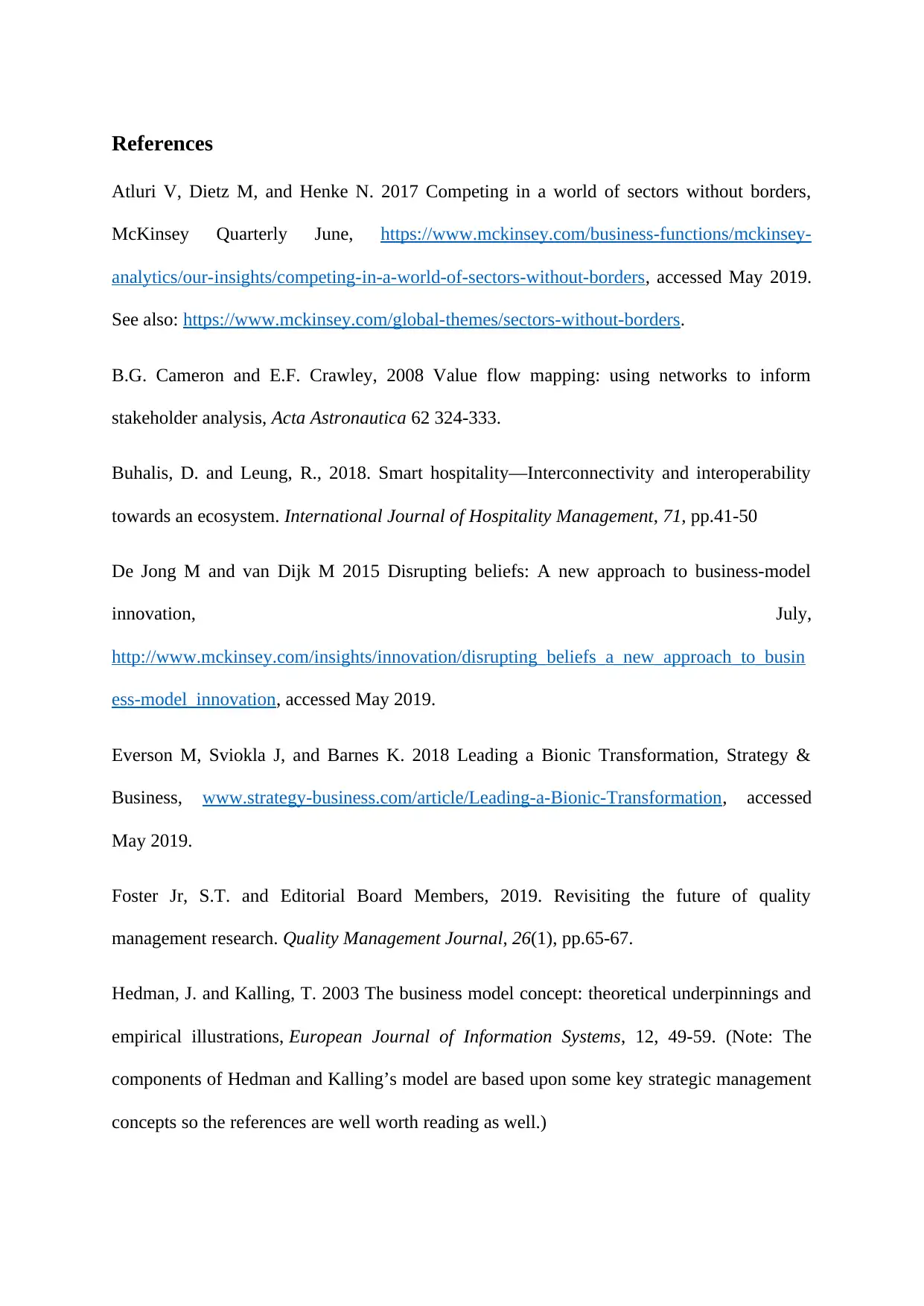
References
Atluri V, Dietz M, and Henke N. 2017 Competing in a world of sectors without borders,
McKinsey Quarterly June, https://www.mckinsey.com/business-functions/mckinsey-
analytics/our-insights/competing-in-a-world-of-sectors-without-borders, accessed May 2019.
See also: https://www.mckinsey.com/global-themes/sectors-without-borders.
B.G. Cameron and E.F. Crawley, 2008 Value flow mapping: using networks to inform
stakeholder analysis, Acta Astronautica 62 324-333.
Buhalis, D. and Leung, R., 2018. Smart hospitality—Interconnectivity and interoperability
towards an ecosystem. International Journal of Hospitality Management, 71, pp.41-50
De Jong M and van Dijk M 2015 Disrupting beliefs: A new approach to business-model
innovation, July,
http://www.mckinsey.com/insights/innovation/disrupting_beliefs_a_new_approach_to_busin
ess-model_innovation, accessed May 2019.
Everson M, Sviokla J, and Barnes K. 2018 Leading a Bionic Transformation, Strategy &
Business, www.strategy-business.com/article/Leading-a-Bionic-Transformation, accessed
May 2019.
Foster Jr, S.T. and Editorial Board Members, 2019. Revisiting the future of quality
management research. Quality Management Journal, 26(1), pp.65-67.
Hedman, J. and Kalling, T. 2003 The business model concept: theoretical underpinnings and
empirical illustrations, European Journal of Information Systems, 12, 49-59. (Note: The
components of Hedman and Kalling’s model are based upon some key strategic management
concepts so the references are well worth reading as well.)
Atluri V, Dietz M, and Henke N. 2017 Competing in a world of sectors without borders,
McKinsey Quarterly June, https://www.mckinsey.com/business-functions/mckinsey-
analytics/our-insights/competing-in-a-world-of-sectors-without-borders, accessed May 2019.
See also: https://www.mckinsey.com/global-themes/sectors-without-borders.
B.G. Cameron and E.F. Crawley, 2008 Value flow mapping: using networks to inform
stakeholder analysis, Acta Astronautica 62 324-333.
Buhalis, D. and Leung, R., 2018. Smart hospitality—Interconnectivity and interoperability
towards an ecosystem. International Journal of Hospitality Management, 71, pp.41-50
De Jong M and van Dijk M 2015 Disrupting beliefs: A new approach to business-model
innovation, July,
http://www.mckinsey.com/insights/innovation/disrupting_beliefs_a_new_approach_to_busin
ess-model_innovation, accessed May 2019.
Everson M, Sviokla J, and Barnes K. 2018 Leading a Bionic Transformation, Strategy &
Business, www.strategy-business.com/article/Leading-a-Bionic-Transformation, accessed
May 2019.
Foster Jr, S.T. and Editorial Board Members, 2019. Revisiting the future of quality
management research. Quality Management Journal, 26(1), pp.65-67.
Hedman, J. and Kalling, T. 2003 The business model concept: theoretical underpinnings and
empirical illustrations, European Journal of Information Systems, 12, 49-59. (Note: The
components of Hedman and Kalling’s model are based upon some key strategic management
concepts so the references are well worth reading as well.)
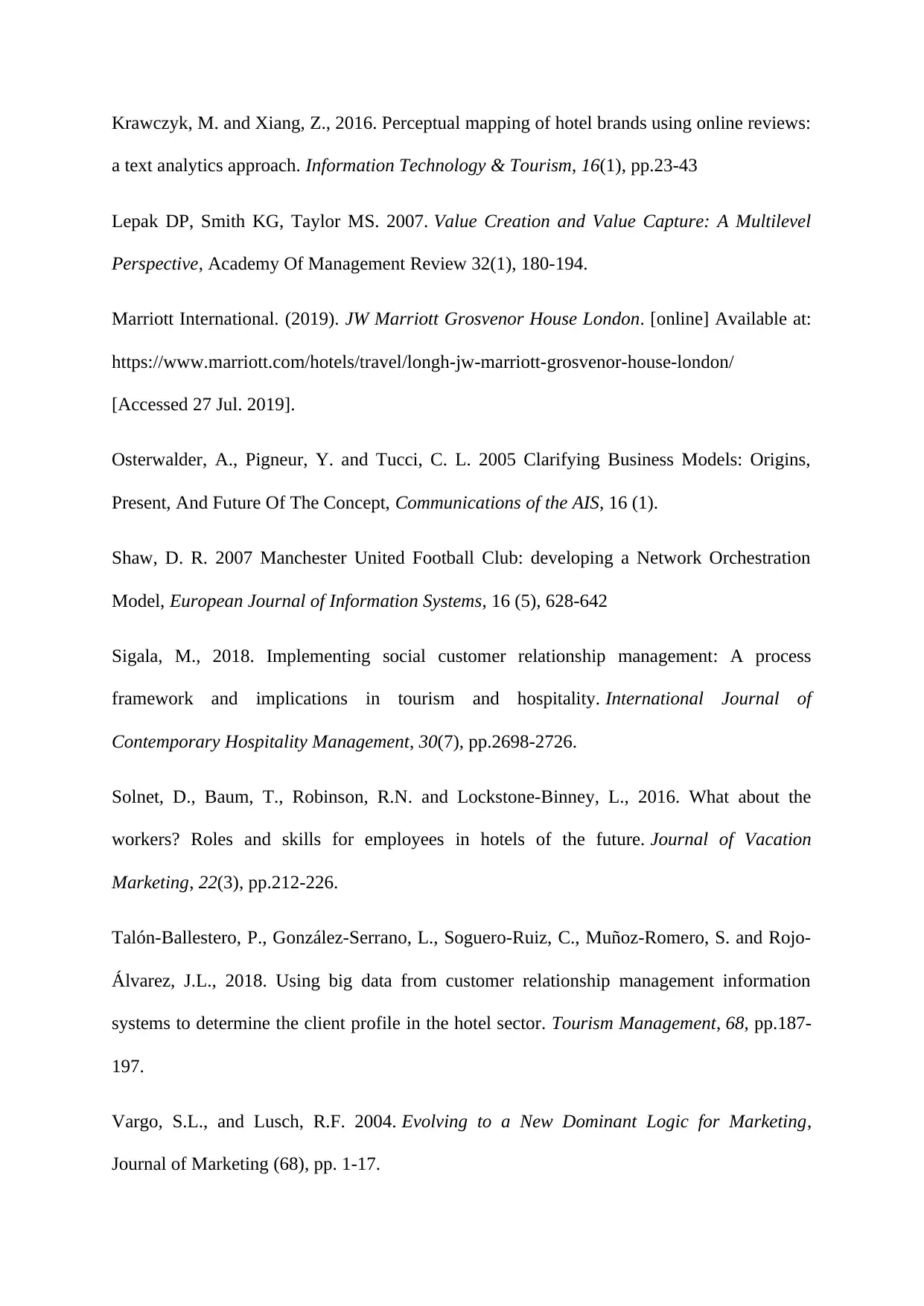
Krawczyk, M. and Xiang, Z., 2016. Perceptual mapping of hotel brands using online reviews:
a text analytics approach. Information Technology & Tourism, 16(1), pp.23-43
Lepak DP, Smith KG, Taylor MS. 2007. Value Creation and Value Capture: A Multilevel
Perspective, Academy Of Management Review 32(1), 180-194.
Marriott International. (2019). JW Marriott Grosvenor House London. [online] Available at:
https://www.marriott.com/hotels/travel/longh-jw-marriott-grosvenor-house-london/
[Accessed 27 Jul. 2019].
Osterwalder, A., Pigneur, Y. and Tucci, C. L. 2005 Clarifying Business Models: Origins,
Present, And Future Of The Concept, Communications of the AIS, 16 (1).
Shaw, D. R. 2007 Manchester United Football Club: developing a Network Orchestration
Model, European Journal of Information Systems, 16 (5), 628-642
Sigala, M., 2018. Implementing social customer relationship management: A process
framework and implications in tourism and hospitality. International Journal of
Contemporary Hospitality Management, 30(7), pp.2698-2726.
Solnet, D., Baum, T., Robinson, R.N. and Lockstone-Binney, L., 2016. What about the
workers? Roles and skills for employees in hotels of the future. Journal of Vacation
Marketing, 22(3), pp.212-226.
Talón-Ballestero, P., González-Serrano, L., Soguero-Ruiz, C., Muñoz-Romero, S. and Rojo-
Álvarez, J.L., 2018. Using big data from customer relationship management information
systems to determine the client profile in the hotel sector. Tourism Management, 68, pp.187-
197.
Vargo, S.L., and Lusch, R.F. 2004. Evolving to a New Dominant Logic for Marketing,
Journal of Marketing (68), pp. 1-17.
a text analytics approach. Information Technology & Tourism, 16(1), pp.23-43
Lepak DP, Smith KG, Taylor MS. 2007. Value Creation and Value Capture: A Multilevel
Perspective, Academy Of Management Review 32(1), 180-194.
Marriott International. (2019). JW Marriott Grosvenor House London. [online] Available at:
https://www.marriott.com/hotels/travel/longh-jw-marriott-grosvenor-house-london/
[Accessed 27 Jul. 2019].
Osterwalder, A., Pigneur, Y. and Tucci, C. L. 2005 Clarifying Business Models: Origins,
Present, And Future Of The Concept, Communications of the AIS, 16 (1).
Shaw, D. R. 2007 Manchester United Football Club: developing a Network Orchestration
Model, European Journal of Information Systems, 16 (5), 628-642
Sigala, M., 2018. Implementing social customer relationship management: A process
framework and implications in tourism and hospitality. International Journal of
Contemporary Hospitality Management, 30(7), pp.2698-2726.
Solnet, D., Baum, T., Robinson, R.N. and Lockstone-Binney, L., 2016. What about the
workers? Roles and skills for employees in hotels of the future. Journal of Vacation
Marketing, 22(3), pp.212-226.
Talón-Ballestero, P., González-Serrano, L., Soguero-Ruiz, C., Muñoz-Romero, S. and Rojo-
Álvarez, J.L., 2018. Using big data from customer relationship management information
systems to determine the client profile in the hotel sector. Tourism Management, 68, pp.187-
197.
Vargo, S.L., and Lusch, R.F. 2004. Evolving to a New Dominant Logic for Marketing,
Journal of Marketing (68), pp. 1-17.
1 out of 13
Related Documents
Your All-in-One AI-Powered Toolkit for Academic Success.
+13062052269
info@desklib.com
Available 24*7 on WhatsApp / Email
![[object Object]](/_next/static/media/star-bottom.7253800d.svg)
Unlock your academic potential
© 2024 | Zucol Services PVT LTD | All rights reserved.





